by cidaut | Mar 12, 2020 | Sin categoría
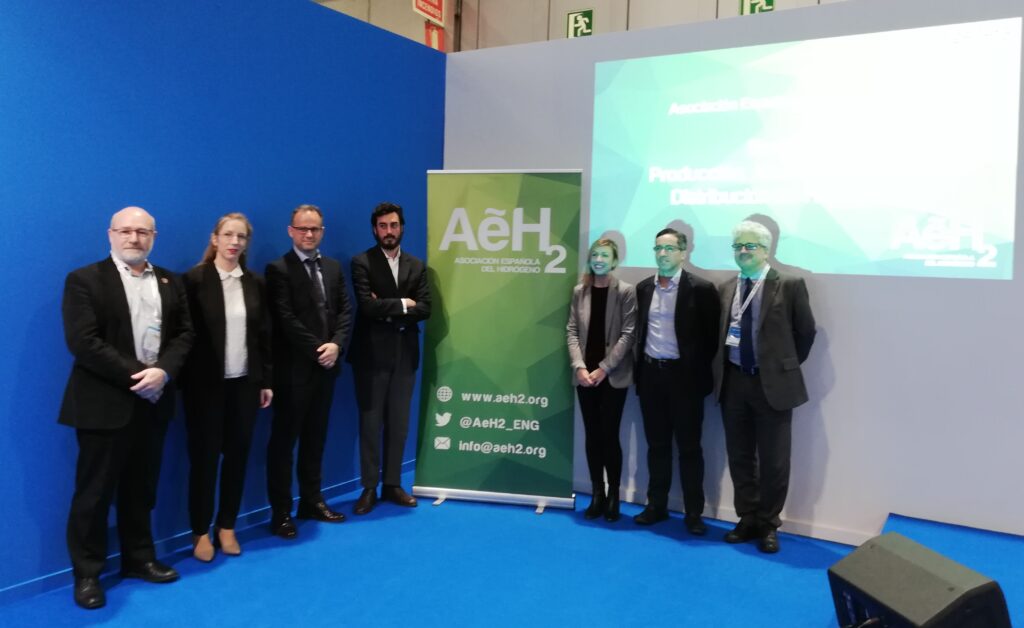
On February 5th, AeH2 organized the Technical Conference “Hydrogen: a key to ensure climate neutrality” held within the framework of the Renewable Energy and Environment Fair, GENERA in Madrid. The full capacity of this conference shows the growing interest in these technologies that will be key in the path towards climate neutrality.
Both at national level, with the Law on Climate Change and the Integrated National Plan for Energy and Climate 2021-2030 (PNIEC), and at international level, with the Green Deal, objectives of renewable energy penetration and decarbonization of the economy are setting very ambitious to reach climate neutrality by 2050.
And that focused on the first part of the Conference: “Climate Neutrality in 2050: the European Green Deal and the Spanish PNIEC” with the participation of D. Alexandru Floristean, legal & project manager in Hydrogen Europe, D. Santiago González, of the department of Regulatory Framework and Corporate Strategy of IDAE and Mr. Javier Brey, president of AeH2. It was moderated by Mr. Antonio González, vice president of AeH2.
In the second part of the conference, moderated by Mr. Miguel A. Peña, secretary of the AeH2, partners of the AeH2 presented hydrogen-based solutions to achieve climate neutrality. It was at this time when CIDAUT, represented by José Ignacio Domínguez, presented its capabilities and work proposals in the production of hydrogen from renewable sources. The rest of the presentations also demonstrated that hydrogen has a great potential in Spain and the drive of projects based on these technologies represents a clear commitment to sustainability and an increasingly green future.
by cidaut | Mar 12, 2020 | Sin categoría
Along March and April CIDAUT will be in charge of the user trials of the European Project SAFE STRIP. The trials will involve 20 drivers and 10 riders that will test different safety applications installed in autonomous vehicles and also in standard vehicles C-ITS equipped. SAFE STRIPS aims to introduce a disruptive technology that has achieved to embed C-ITS applications in existing road infrastructure, including novel I2V and V2I, as well as VMS/VSL functions into low-cost, integrated strip markers on the road; to make roads self-explanatory (with personalized in-vehicle messages) and forgiving (due to advanced cooperative functions) for all road users (trucks, cars and vulnerable road users, such as PTWs riders) and all vehicle generation (non-equipped, C-ITS equipped, autonomous), with reduced maintenance cost, full recyclability and added value services, as well as supporting real-time predictive road maintenance functions.
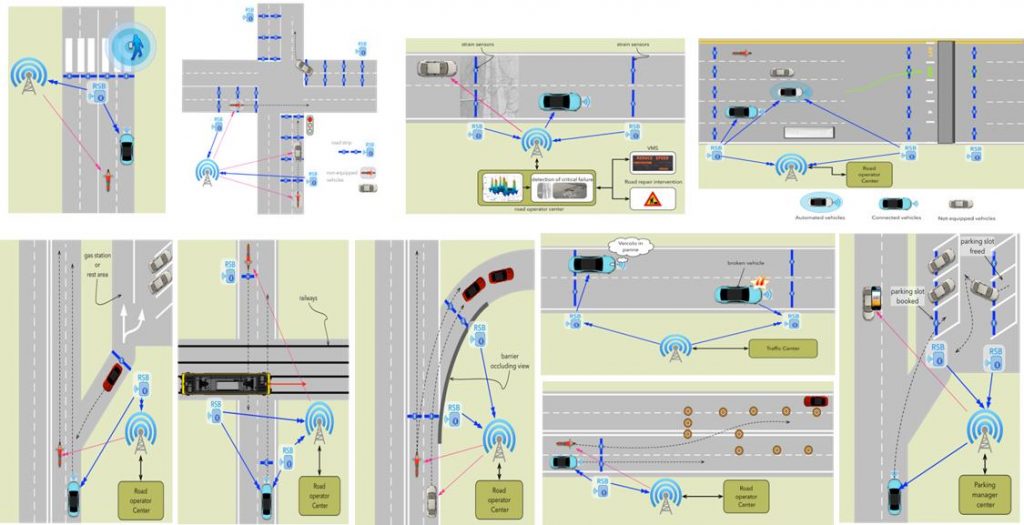
SAFE STRIP consortium is formed by 18 partners that have collaborated for three years in the development of innovative solutions to improve safety, mobility, efficiency, emissions and society. Some of the partners, Valeo, Continental and Certh are using their autonomous vehicles to test the applications developed. The scenarios to be tested are: vulnerable road users protection, wrong way driving detection, road wear level and predictive road maintenance, work zone detection, railway crossing detection, urban intersection support, motorway exit, virtual variable message signals, dynamic trajectory estimation, definition of lane-level virtual corridors, virtual toll and parking support.
Along the tests CIDAUT will make pre and post questionnaires to the users that together with the data registered in the trials and the traffic flow simulations made by the University of Trento will provide all the information needed to make an impact assessment about the influence of the solutions adopted in safety, mobility, efficiency and exhaust emissions. In parallel, a cost benefit analysis will be performed to determine the economic availability of the different solutions implemented.
by cidaut | Jan 9, 2020 | Sin categoría
As part of the preparation of the first call for proposals under the Innovation Fund (IF), the European Commission has invited sector associations and Member States to organize workshops in all European countries. Last 19th November, the Spanish workshop took place in the Ministry of Industry, Commerce and Tourism where the Commission presented the Innovation Fund and the essential elements to be developed for the first call.
The Innovation Fund is one of the world’s largest funding programmes for demonstration of innovative low-carbon technologies. The Innovation Fund focuses on 4 pillars of work: EEI, renewable energy, energy storage and carbon capture.
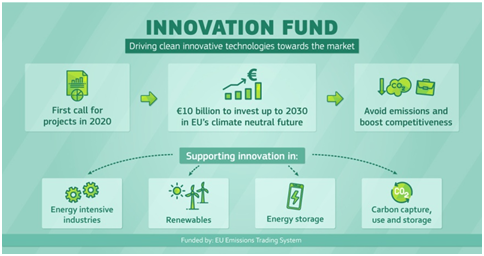 General scheme for Innovation Fund Programme
General scheme for Innovation Fund Programme
17 industrial and energy partners such as Repsol, Enagas, ArcelorMittal, Fertiberia and Saint Gobain exposed different low carbon solutions related with future eligible projects in IF. CIDAUT, together with the Spanish Bioethanol Association (Bio-E), proposed the most important lines of work for this renewable fuel. Solutions are focused on increasing the production of bioethanol per hectare of crop, eg: increasing the added value of co-products obtained in alcoholic fermentation processes; or focused on increasing the use and presence of bioethanol in different sectors: transport (extensive use of E10 and E85 gasoline vehicles), cogeneration or use in dedicated engines for nZEB (nearly Zero Emission Buildings).
More in detail, CIDAUT and Bio-E exposed a project approach focused on using CO2 emitted by bioethanol manufacturing industries together with renewable hydrogen to increase the synthesis production of chemicals such as methanol.
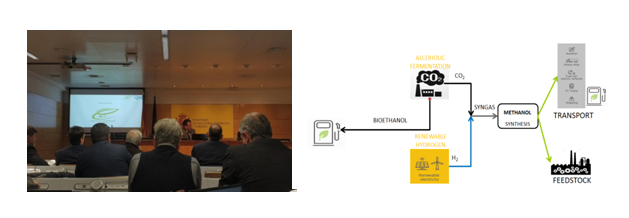 CIDAUT exposition and proposal overview
CIDAUT exposition and proposal overview
by cidaut | Oct 22, 2019 | Sin categoría
The 1st Regional Cyber Security Forum was organized CIDAUT Foundation, as well as, the Interreg Europe CYBER project partner Institute for Business Competitiveness of Castilla y León (ICE) under the training and support Program for R&D Business Centr@Tec, in collaboration with the General Foundation and the BISITE Research Group of the University of Salamanca, the VIEWNEXT Innovation and the National Cybersecurity Institute (INCIBE). This Forum had aimed to facilitate the development of the regional cybersecurity ecosystem, to encourage the regional entrepreneurship and the attraction of talents to the cybersecurity field. Finally, it also aims to promote the activities of the Regional Cybersecurity Pole.
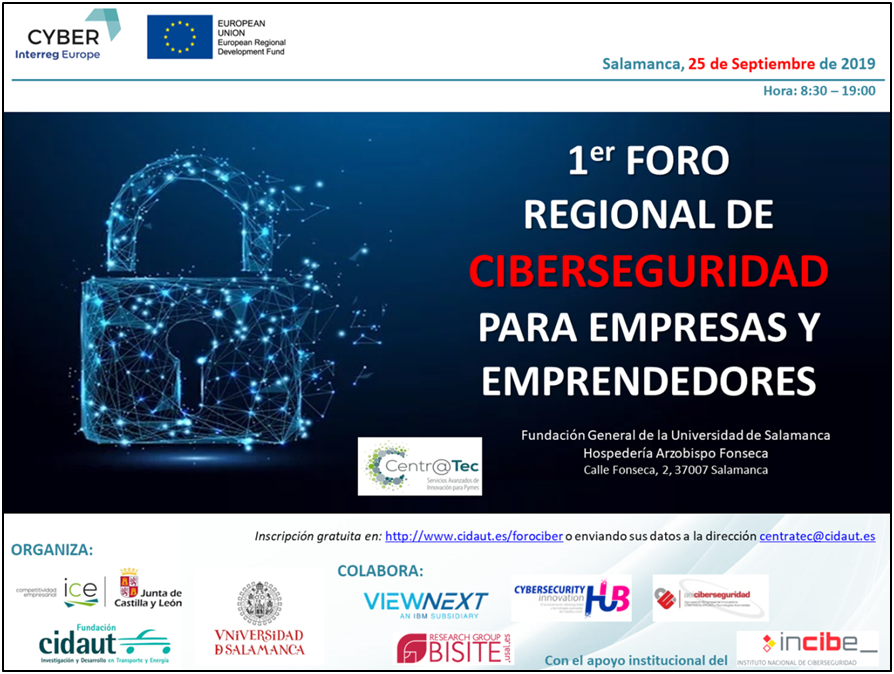
The official opening of this event was carried out by Mrs. Beatriz Casado (Chief of Innovation and Entrepreneurship of Institute for Business Competitiveness of Castilla y León) and Mr. Enrique Cabero (Vice-rector of Academic Policy and Social Participation at the University of Salamanca).
Next, Mr. Deepak Daswani (Chiefs Security Ambassadors of ELEVENPATHS) presented a global view of the cybersecurity for a competitive industry. Mr. Faustino Nieto (CEO of Productos Ibéricos FANISA SL) showed that cyber-attacks exist across his own personal story. This was followed by a presentation of different successful cases in the cybersecurity context. Different cybersecurity solutions used by the automotive industry and food sector was showed, respectively, by Mr. Álvaro Villarino and Mr. Eduardo Sanz (R&D Project Managers of CIDAUT Foundation) and Mr. Juan Manuel García (CISO of Cerealto Siro Foods). While, Mr. José Alberto García Coria and Mr. Victor Flores (VIEWNEXT) made an applied demonstration of ethical hacking. Subsequently, Mr. Daniel Fírvida (Project Manager at National Cybersecurity Institute – INCIBE) made a presentation on “Industrial cyber-security vs Industry 4.0” and Mr. Miguel Carriegos (Professor at University of Leon) spoke about “Competences, skills and talent management in cyber-security”.
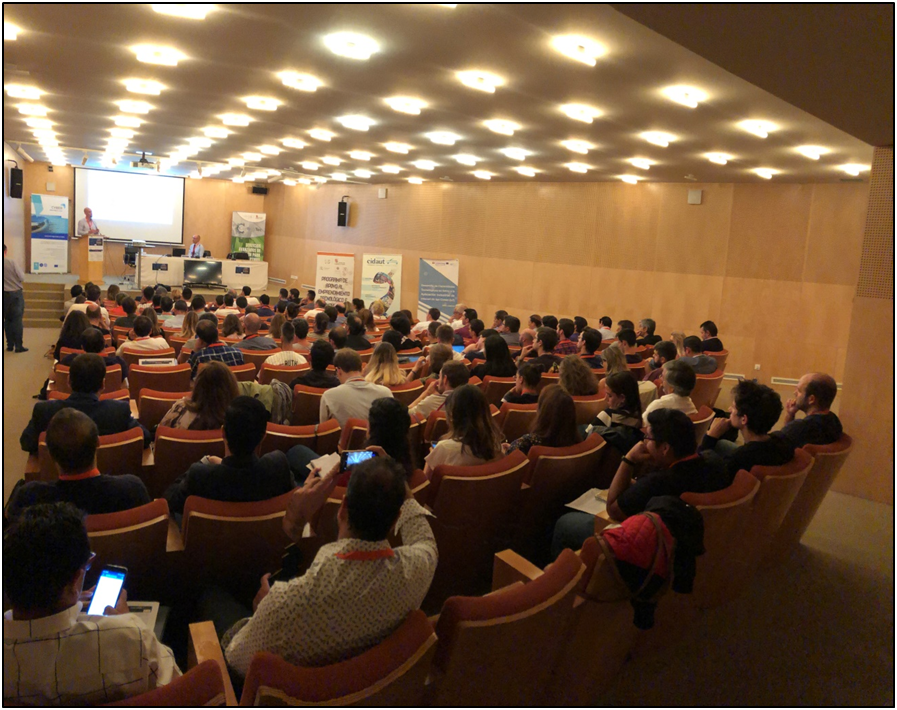
After lunch, Mr. José Francisco de Diego (Regional Manager of Institute for Business Competitiveness of Castilla y León at Salamanca) showed the Interreg Europe CYBER project, and Mr. Tomás Castro (president of the Spanish Cybersecurity Innovation Cluster) made a presentation on the Cybersecurity Innovation HUB.
The Forum proceeded with a discussion panel in which all attendees were encouraged to take part: Mr. Antonio Sahagún (ELEVENPATHS), Mr. Juan Manuel García (CEREALTO SIRO FOODS), Mr. Fernando Pérez (AETICAL), Mr. Manuel Domínguez (UNIVERSITY OF LEÓN), Mr. Benjamín Sahelices (UNIVERSITY OF VALLADOLID), Mr. Javier Martín Limorti (UNIVERSITY OF SALAMANCA) and Mr. Álvaro García (CIDAUT Foundation). Finally, Mrs. Beatriz Casado (Chief of Innovation and Entrepreneurship of Institute for Business Competitiveness of Castilla y León) closed the Forum and invited the attendees to participate in the next workshops and events organized under the training and support Program for R&D Business Centr@Tec.
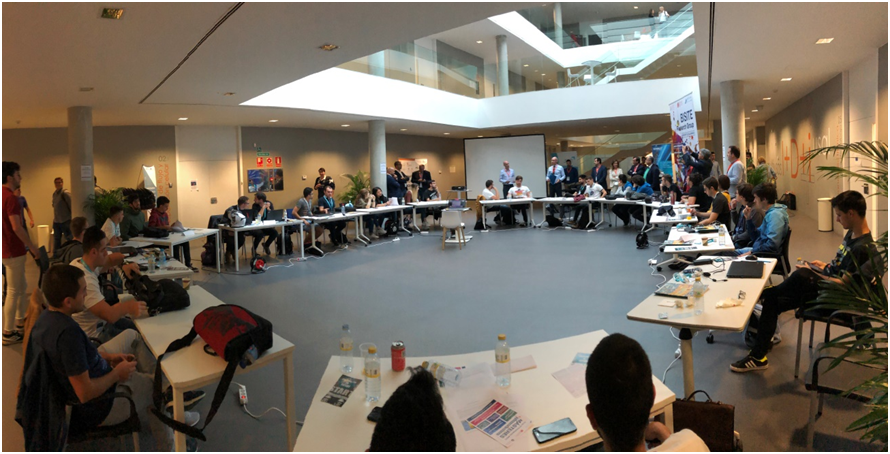
In addition to thematic workshops and panel discussions, a cyber-exercise “Capture the Flag” (CTF) took also place on the day of the event. This cyber exercise provided a forum for the local cybersecurity talents to demonstrate their skills and to be recognized by the cybersecurity stakeholders.
by cidaut | Oct 22, 2019 | Sin categoría
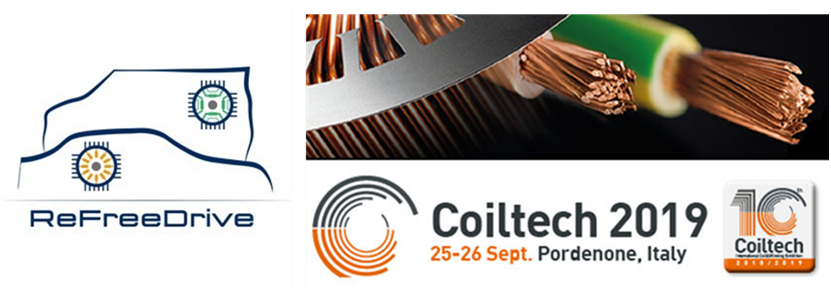
Coiltech hosts the World Magnetic Conference, chaired by Prof. Marco Villani (University of L’Aquila one of the partner of ReFreeDrive project), the biggest conference in its field. WMC offers both visitors and exhibitors and excellent opportunity to update one’s knowledge about innovation of materials, methods and technologies for further improvement of efficiency in production, distribution, transformation and consumption of electrical energy.
ReFreeDrive’s partners had an excellent experience last year at Coiltech 2018. For this reason, they have met again at Coiltech 2019. During the Conference the partners presented the most relevant technical results of the project that is starting its third and last year. The session, specially dedicated to the ReFreeDrive project, started with the general overview of the project presented by Cidaut as Coordinator. After the introduction, Jaguar Land Rover, Motor Design Limited, IFPEN, L´Aquila University, Breuckman and European Copper Institute explained some of the technical details of the project.
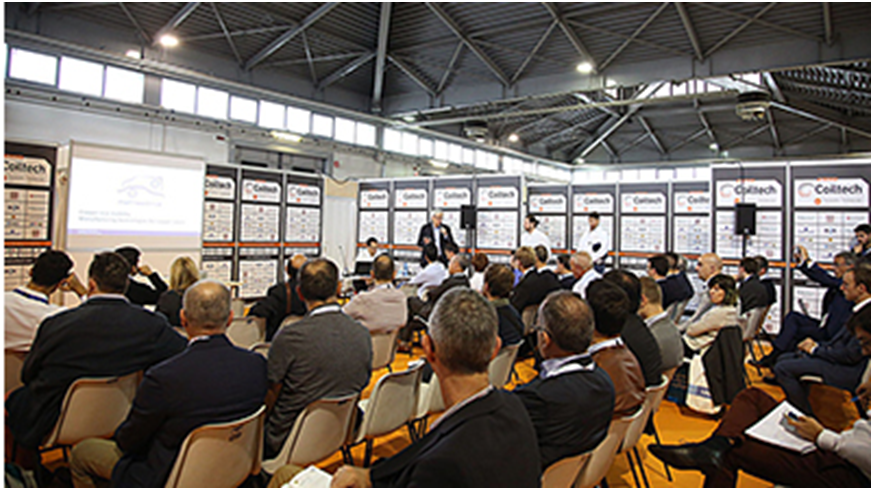
ReFreeDrive has been funded by the European Commission in the H2020 Frame Programme and it aims to avoid the use of rare earth magnet through the development of a next generation of electric drive trains, ensuring the industrial feasibility for mass production while focusing on the low cost of the manufacturing technologies.
by cidaut | Oct 22, 2019 | Sin categoría

Safe Strip is a European Project funded in the H2020 Frame Programme. It started in May 2017 with the aim to introduce a disruptive technology that will achieve to embed C-ITS applications in existing road infrastructure following a low cost – high impact approach. For the last two years and a half the technical development of the strips and the definition of the different use cases have been achieved. The performance of the different parts of the system have been tested in laboratory and open road conditions, but now the trial phase has reached to the critical point.
The 35 scenarios, classified in 9 uses cases defined in the project are going to be tested with real users in five different test tracks: Centro Ricerche Fiat and A22 in Italy, Thessaloniki and Atiki Odos in Greece and Cidaut in Spain. For the tests different vehicles will be used, motorcycles and cars, with different levels of automation.
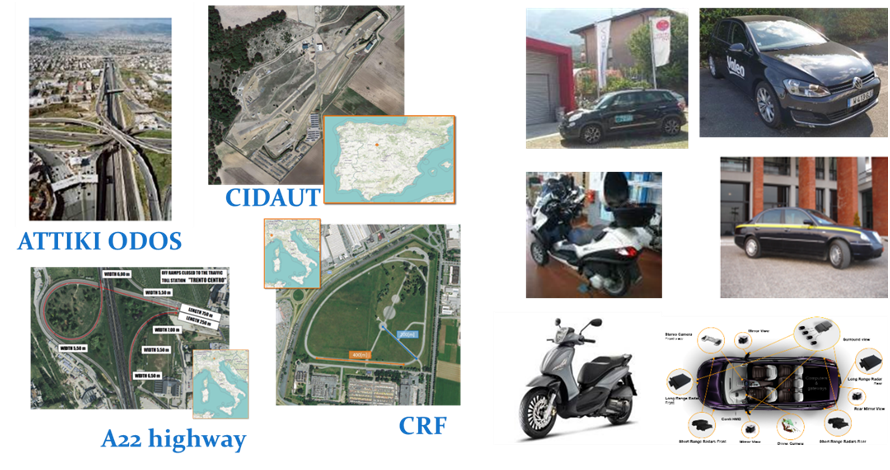 Trials sites and some of the vehicles to be used
Trials sites and some of the vehicles to be used
The results of the tests will be quantitatively and qualitatively analyzed, through vehicle instrumentation, surveys and questionnaires in order to assess the impact of the applications developed in Safe Strip in the safety, environment, society, traffic, economy and the users’ acceptance.










